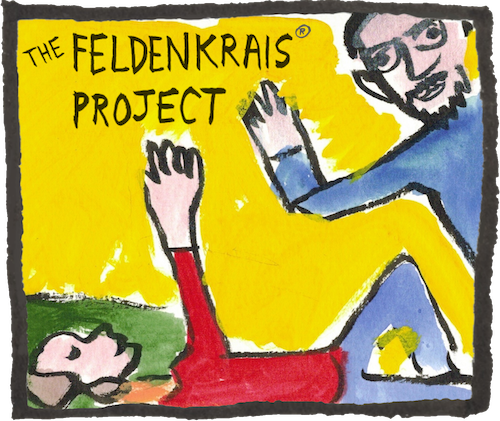Position: back-lying
62m
Simple Twisting
Back-lying, often both knees bent. Tipping crossed legs and eventually "triangle arms" to gently twist, turn, and roll the body, in order to learn more awareness, control, and coordination of the major flexor and extensor muscles of the torso.
58m
Easier Sitting Workshop Lesson 1
Chair-seated, with a middle portion in back-lying. Identifying the sitbones and enriching your awareness of them, then developing the relationships between the head, sitbones, and spine as they relate to plumb (the line of gravity through the vertical skeleton). Introduces the classic Feldenkrais pelvic clock image as a way to refine and expand dynamic support possibilities for the sitbones, pelvis, and whole self.
70m
Breath, Belly, Back, and Hips: Connecting to the Earth (workshop lesson)
Back-lying, mostly knees bent, framed by brief explorations in standing. Investigations of the lower torso, especially as it connects through the legs and feet to the earth. This lesson develops awareness and spaciousness of this "middle" area, and the tanden is discussed and sensed. (The tanden is a concept from the martial arts, also known as the lower dantian.)
63m
Fundamentals of a Healthy Back (workshop lesson)
Back-lying, often knees bent, sometimes legs crossed, tilting. Clarifying our image of the "five curves" of the axial skeleton in action: the traditional three (lumbar, thoracic, and cervical spine), plus the sacrum/tailbone and the skull. Learning to sense functions and efforts through all five curves, including breathing. See the Context tab if you wish to go on to the next lesson in the workshop.
59m
Driving and Dynamic Sitting – Floor Practice
Mostly back-lying. Begins and ends in floor-seated. With explorations and benefits for all sitting situations, this lesson uses imagery of being in the driver's seat to promote lively, dynamic sitting and turning while negotiating the challenge of a typical "bucket" car seat. Postural expressions of rounding and arching are clarified, then used to improve the range, comfort, and awareness of whole body turning movements.
60m
The Hip Joints: Moving Proximal Around Distal
Back-lying, knees bent, feet standing, often one leg resting out to the side on a pillow. Learning to move the whole self (proximal) in relationship to a quietly resting limb (distal), often using pelvic clock movements. This reversal of the typical image we have of moving a limb creates a novel learning environment within the self, with benefits for the legs, hips, back, and our overall organization. Sitting on the floor at the beginning and end of the lesson is used to help identify some of the changes that take place.
61m
Spine Like a Chain, Freeing the Shoulder Girdle
Back-lying, knees bent, learning to gradually lift and lower the pelvis and spine. This variant of a classic Feldenkrais lesson cultivates awareness especially around the middle and upper spine and ribs, the shoulder blades, sternum, and C7 (seventh cervical vertebra) region.
62m
Rolling to Sitting, and Beyond
How do we get off the floor? This lesson explores the path from lying on your back to sitting up, and getting back down again, organizing the torso and limbs towards a smoother, simpler, more pleasurable transition. These movements are also powerful organizers for improving upright posture.
64m
More Precise Hips and Spine
Back-lying, knees bent, with a floor-seated frame at the beginning and end. Preparing for and clarifying an important primary relationship in the body: arching the spine while flexing the hips.
64m
Agile Hips, Knees, and Feet
Back-lying, knees bent, feet standing, exploring connections between the joints of the legs, and clarifying their relationship with the abdominal muscles, pelvis, back, breath, and head. Improving leg function by developing some movements into rapid action.
